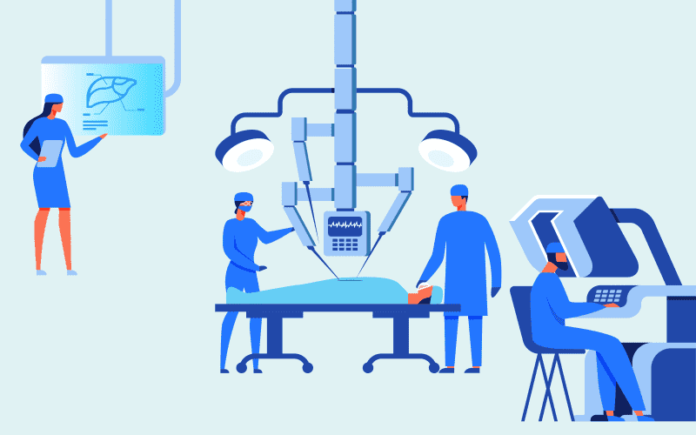Biomedical engineering focuses on improving the quality of life through innovative medical technologies. The following article discusses the fields in biomedical engineering, including medical imaging, rehabilitation, and clinical engineering.
What are the Current Biomedical Engineering Fields?
Biomedical engineering has several fields, including the following:
Bioinstrumentation
Bioinstrumentation is a specialty that is based on the design of tools and equipment for diagnosing and treating diseases of all kinds with the help of computers and other electronic devices, and these devices are high-tech and expensive and are used to conduct advanced research in the biological sciences.
Biomaterials
Biomaterials is the field specialized in the rapidly developing biomaterials industry, where biomaterials engineers apply their studies in engineering and biology to the design and development of health products and systems, Biomaterials help facilitate recovery for people after illness, and can be These materials are natural or synthetic and are used to support or replace damaged tissues or biological functions, as well as support tissue regeneration and nanoparticles that can detect cancers, and these materials must be tested to ensure their safety before using them in the human body.
Biomechanics
Biomechanics focuses on the force affecting the movement of objects and is based on the study of biological systems in terms of their structure and function.
This field combines physical and engineering expertise with biological and medical sciences. Biomechanical engineers manufacture products such as heart valves. Prosthetics and artificial joints that helped people and made their lives less painful.
Genetic, Cellular and Tissue Engineering
Genetic engineering, cellular, and tissue engineering is the production of living tissues outside the body and their replacement or the use of therapeutic applications through the generation of materials, biochemical processing, cell culture, and genetic engineering, this field focuses on preventing or stopping diseases through gene alteration and stem cell therapy.

Clinical Engineering
Clinical engineering engineers work in the application of biological research and development of healthcare settings such as hospitals and physicians’ places, and this field trains doctors, nurses, and other medical professionals in the use of advanced technologies with patients.
Orthopedic Bioengineering
The field of orthopedic bioengineering combines principles of tissue engineering, cell biology and biomechanics to develop new concepts of bone and soft tissue, where bones, muscles, and joints are damaged or destroyed by accidents or disease, and engineers in this field develop special orthopedic products that allows better movement and performance so that it offers a better life for people and their bodies can regain their lost function.
Rehabilitation Engineering
Rehabilitation engineering uses engineering principles to develop solutions and devices that help individuals with disabilities meet their needs such as movement, communication, hearing and vision, and also help improve ways to restore bodily functions lost due to congenital disorders or diseases such as stroke or injury, loss of limbs to restore mobility, it also has the potential to develop brain-computer interfaces that allow individuals with disabilities to operate computers or other devices by thinking about the task they want to perform.
Systems Physiology
The field of Systems physiology uses engineering principles and tools to understand how different organisms function.
Neural Engineering
Neural engineering engineers are interested in understanding and interacting with the nervous system.
Engineers create computer models of complex nervous systems or single neurons.
Scientists know how neurons communicate with each other and provide new ways of interacting between nervous tissues and technologies and this is called brain-machine communication.
Read Also
- How to Drive Growth Through Customer Centricity in Healthcare
 The world of healthcare is changing in big ways. Consumers are now stepping up and taking charge of their health journeys. This change is happening now for important reasons. The U.S. health and wellness market is huge, projected to be over $6 trillion in 2025. This growth is fueled by rising out-of-pocket costs and more… Read more: How to Drive Growth Through Customer Centricity in Healthcare
The world of healthcare is changing in big ways. Consumers are now stepping up and taking charge of their health journeys. This change is happening now for important reasons. The U.S. health and wellness market is huge, projected to be over $6 trillion in 2025. This growth is fueled by rising out-of-pocket costs and more… Read more: How to Drive Growth Through Customer Centricity in Healthcare - Why Biotech Companies Choose Contract Manufacturing Organizations for Scalable Growth
 Biotech and pharmaceutical companies are under constant pressure to innovate, scale fast, and stay compliant. Doing everything in-house can slow them down. That’s why many are turning to a contract manufacturing organization to handle specialized production needs—especially in genetic and molecular biology fields. Reliable CMOs offer speed, precision, and regulatory knowledge. For early-stage firms, this… Read more: Why Biotech Companies Choose Contract Manufacturing Organizations for Scalable Growth
Biotech and pharmaceutical companies are under constant pressure to innovate, scale fast, and stay compliant. Doing everything in-house can slow them down. That’s why many are turning to a contract manufacturing organization to handle specialized production needs—especially in genetic and molecular biology fields. Reliable CMOs offer speed, precision, and regulatory knowledge. For early-stage firms, this… Read more: Why Biotech Companies Choose Contract Manufacturing Organizations for Scalable Growth - Maximizing Digital Reach for Podiatry Clinics in Local Healthcare
 Maximizing Digital Reach for Podiatry Clinics in Local Healthcare As the healthcare industry evolves, mobile marketing becomes indispensable for practitioners. Podiatry clinics, focusing on foot and ankle care, must adapt to digital strategies to engage patients effectively. Implementing tailored SEO practices is crucial for these clinics to thrive in an increasingly competitive market. Digital marketing… Read more: Maximizing Digital Reach for Podiatry Clinics in Local Healthcare
Maximizing Digital Reach for Podiatry Clinics in Local Healthcare As the healthcare industry evolves, mobile marketing becomes indispensable for practitioners. Podiatry clinics, focusing on foot and ankle care, must adapt to digital strategies to engage patients effectively. Implementing tailored SEO practices is crucial for these clinics to thrive in an increasingly competitive market. Digital marketing… Read more: Maximizing Digital Reach for Podiatry Clinics in Local Healthcare - Optimizing CT Protocols: The Hidden Key to Efficiency and Cost Savings in Radiology
 Introduction: Why CT Protocol Optimization Matters Computed Tomography (CT) is a cornerstone of modern diagnostic imaging, providing critical information across nearly every medical specialty. However, maximizing the value of CT — both clinically and financially — requires more than just advanced hardware. The real secret lies in the optimization of CT protocols. When CT protocols… Read more: Optimizing CT Protocols: The Hidden Key to Efficiency and Cost Savings in Radiology
Introduction: Why CT Protocol Optimization Matters Computed Tomography (CT) is a cornerstone of modern diagnostic imaging, providing critical information across nearly every medical specialty. However, maximizing the value of CT — both clinically and financially — requires more than just advanced hardware. The real secret lies in the optimization of CT protocols. When CT protocols… Read more: Optimizing CT Protocols: The Hidden Key to Efficiency and Cost Savings in Radiology - How to Start a Mental Health Conversation with Your Manager
 Talking about mental health at work can feel awkward, intimidating, or even risky. But if you’re struggling, keeping it bottled up isn’t going to make things better. Having an open and honest conversation with your manager can be a game-changer, whether you need accommodations, support, or just someone to understand what you’re going through. This… Read more: How to Start a Mental Health Conversation with Your Manager
Talking about mental health at work can feel awkward, intimidating, or even risky. But if you’re struggling, keeping it bottled up isn’t going to make things better. Having an open and honest conversation with your manager can be a game-changer, whether you need accommodations, support, or just someone to understand what you’re going through. This… Read more: How to Start a Mental Health Conversation with Your Manager
Biomedical Engineering Jobs
The following are some of the jobs in the field of biomedical engineering, and they are as follows:
Biomaterials Developer
Engineers develop biomaterials that may be natural living tissue or synthetic materials.
Manufacturing Engineer
A manufacturing engineer works to create low-cost, high-quality goods, and to make products such as laboratory equipment and prosthetics.
Independent Consultant
The independent consultant works with medical organizations and research institutions by providing advice and recommendations.
Biomedical Researcher
They conduct research that helps improve human health.
Rehabilitation Engineer
The engineer performs rehabilitation on projects as diverse as mechanical equipment or virtual reality systems.
Medical Technology Developer
The engineer develops hardware and software that assist in the manufacture of medical devices.






